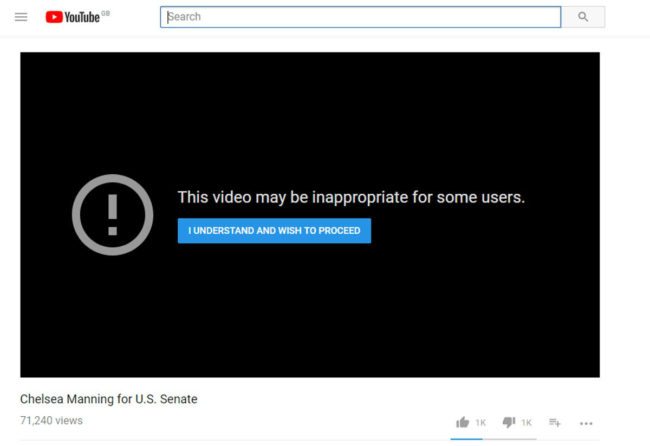Chelsea Manning: YouTube removes ‘inappropriate’ label from campaign video

Chelsea Manning (Photo by Thos Robinson/Getty Images for The New Yorker)
Chelsea Manning (Photo by Thos Robinson/Getty Images for The New Yorker)
YouTube has lifted an age warning placed on Chelsea Manning’s election campaign video.
Manning announced that she is to run in the Democratic Primary for the US Senate seat of Maryland last weekend, releasing a video to announce the move.
The video sharing platform restricted access to the video but was unable to give a reason when asked for comment by PinkNews.

The video was labelled “inappropriate for some users” and age restricted.
YouTube guidelines say it restricts videos if the content involves nudity, is sexually explicit, hateful, harmful or if it is violent or dangerous.
Other rules include copyright and privacy, though it is unlikely the video would remain live if this were the issue.

Chelsea Manning (Photo by Thos Robinson/Getty Images for The New Yorker)
YouTube declined to comment on why transgender activist Manning’s video was marked as age restricted when approached by PinkNews.
Following PinkNews’ report on the restrictions the limitations were lifted.
In the campaign video, released last Sunday, Manning says Americans should “stop expecting that our systems will fix themselves” and calls for citizens to “take the reigns of power”.

Chelsea Manning at OUT100 Awards (Photo by Bryan Bedder/Getty Images for OUT Magazine)
She explains: “We don’t need, or better leaders, we need someone willing to fight.
“We need to stop asking them to give us our rights. They won’t support us, they won’t compromise.”
Manning is set to challenge sitting senator Ben Cardin, who has served two terms in the Senate.
He was first elected in 2007 and serves as a Democrat.
Senator Cardin, a moderate within the Democrats, is also a strong supporter of LGBT rights.

Chelsea Manning
The former Army private and whistleblower was convicted of passing sensitive government documents to Wikileaks and spent seven years behind bars, before being pardoned by President Obama.
Manning was just 22 when she shared the US diplomatic correspondence, which included evidence of civilian deaths in Iraq and Afghanistan, profiles of detainees at Guantanamo prison camp, and low-level battlefield reports.
“I’ve accepted responsibility for my own decisions and my own actions,” she said.
Manning says she wanted to go through traditional media routes, but it was not doable.

“I think it’s important to remember that when somebody sees government wrongdoing – whether it’s illegal or immoral or unethical – there isn’t the means available to do something about it.
“Everyone keeps saying, ‘You should have gone through the proper channels!
“But the proper channels don’t work.”
Manning says she technically tried to get the information out through the mainstream press – but opted to go through WikiLeaks after getting nervous about her short window of opportunity to release the information.

